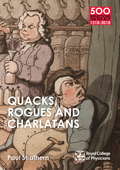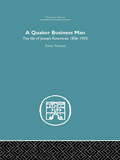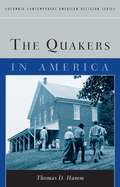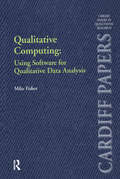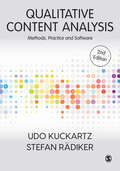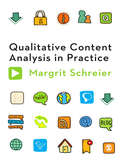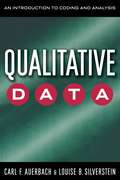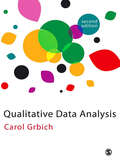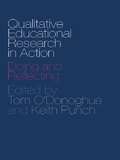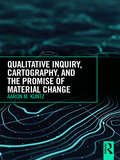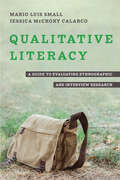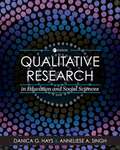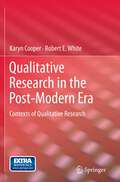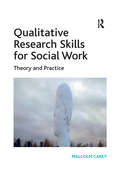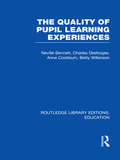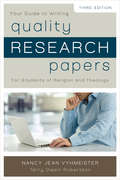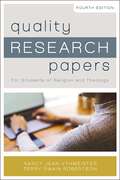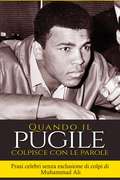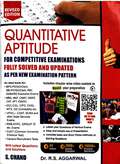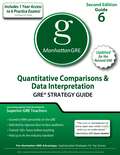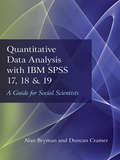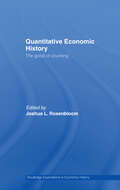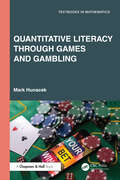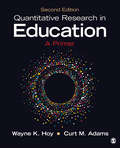- Table View
- List View
Quacks, Rogues and Charlatans of the RCP (500 Reflections on the RCP, 1518-2018 #3)
by Mr Paul StrathernThe Royal College of Physicians celebrates its 500th anniversary in 2018, and to observe this landmark is publishing this series of ten books. Each of the books focuses on fifty themed elements that have contributed to making the RCP what it is today, together adding up to 500 reflections on 500 years. Some of the people, ideas, objects and manuscripts featured are directly connected to the College, while others have had an influence that can still be felt in its work. This third book in the series is a lively tour of some of the colourful characters and dubious cures that have littered the College's 500-year history, and highlights the role the College has played in regulating the medical profession.
Quaker Business Man: The Life of Joseph Rowntree
by Anne VernonFirst Published in 2005. Routledge is an imprint of Taylor & Francis, an informa company.
The Quakers in America (Columbia Contemporary American Religion Series)
by Thomas HammThe Quakers in America is a multifaceted history of the Religious Society of Friends and a fascinating study of its culture and controversies today. Lively vignettes of Conservative, Evangelical, Friends General Conference, and Friends United meetings illuminate basic Quaker theology and reflect the group's diversity while also highlighting the fundamental unity within the religion. Quaker culture encompasses a rich tradition of practice even as believers continue to debate whether Quakerism is necessarily Christian, where religious authority should reside, how one transmits faith to children, and how gender and sexuality shape religious belief and behavior. Praised for its rich insight and wide-ranging perspective, The Quakers in America is a penetrating account of an influential, vibrant, and often misunderstood religious sect. Known best for their long-standing commitment to social activism, pacifism, fair treatment for Native Americans, and equality for women, the Quakers have influenced American thought and society far out of proportion to their relatively small numbers. Whether in the foreign policy arena (the American Friends Service Committee), in education (the Friends schools), or in the arts (prominent Quakers profiled in this book include James Turrell, Bonnie Raitt, and James Michener), Quakers have left a lasting imprint on American life. This multifaceted book is a concise history of the Religious Society of Friends; an introduction to its beliefs and practices; and a vivid picture of the culture and controversies of the Friends today. The book opens with lively vignettes of Conservative, Evangelical, Friends General Conference, and Friends United meetings that illuminate basic Quaker concepts and theology and reflect the group's diversity in the wake of the sectarian splintering of the nineteenth century. Yet the book also examines commonalities among American Friends that demonstrate a fundamental unity within the religion: their commitments to worship, the ministry of all believers, decision making based on seeking spiritual consensus rather than voting, a simple lifestyle, and education. Thomas Hamm shows that Quaker culture encompasses a rich tradition of practice even as believers continue to debate a number of central questions: Is Quakerism necessarily Christian? Where should religious authority reside? Is the self sacred? How does one transmit faith to children? How do gender and sexuality shape religious belief and behavior? Hamm's analysis of these debates reveals a vital religion that prizes both unity and diversity.
Qualitative Computing: Using Software for Qualitative Data Analysis (Cardiff Papers in Qualitative Research)
by Mike FisherAs qualitative researchers incorporate computer assistance into their analytic approaches, important questions arise about the adoption of new technology. Is it worth learning computer-assisted methods? Will the pay-off be sufficient to justify the investment? Which programs are worth learning? What are the effects on the analysis process? This book complements the existing literature by giving a detailed account of the use of four major programs in analyzing the same data. Priority is given to the tasks of qualitative analysis rather than to program capability and the programs are treated as tools rather than as a discipline to be acquired. The key is not what the programs allow researcher to do, but whether the tasks that researchers need to undertake are facilitated by the software. Thus the study develops a user-centred approach to the adoption of computer-assisted qualitative data analysis. The author emphasises qualitative analysis as a creative craft, but one which must increasingly be subject to rigorous methodological scrutiny. The adoption of computer-aided methods offers opportunities, but also dangers and ultimately this book is about the scientific qualitative research. Written in a distinctive and succinct style, this book will be valuable to social science researchers and students interested in qualitative research and in the potential for computer-assisted analysis.
Qualitative Content Analysis: Methods, Practice and Software
by Udo Kuckartz Stefan RadikerAre you working with qualitative data but unsure how to approach your analysis? This hands-on guide to qualitative content analysis from two internationally renowned experts provides you with a clear strategy for analysing your data, whether you are working with social media content, field notes, images, narratives or focus group data. Using qualitative interviews as an example, the book provides a clear structure for approaching your analysis that can be adapted for your research project. Explaining how qualitative content analysis differs from quantitative methods, the book provides you with: •a solid understanding of the principles behind QCA •a step-by-step guide to three types of QCA •guidance on how you can use software to enhance your analysis.
Qualitative Content Analysis: Methods, Practice and Software
by Udo Kuckartz Stefan RadikerAre you working with qualitative data but unsure how to approach your analysis? This hands-on guide to qualitative content analysis from two internationally renowned experts provides you with a clear strategy for analysing your data, whether you are working with social media content, field notes, images, narratives or focus group data. Using qualitative interviews as an example, the book provides a clear structure for approaching your analysis that can be adapted for your research project. Explaining how qualitative content analysis differs from quantitative methods, the book provides you with: •a solid understanding of the principles behind QCA •a step-by-step guide to three types of QCA •guidance on how you can use software to enhance your analysis.
Qualitative Content Analysis in Practice
by Margrit SchreierQualitative content analysis is a powerful method for analyzing large amounts of qualitative data collected through interviews or focus groups. It is frequently employed by students, but introductory textbooks on content analysis have largely focused on the quantitative version of the method. In one of the first to focus on qualitative content analysis, Margrit Schreier takes students step-by step through: - creating a coding frame - segmenting the material - trying out the coding frame - evaluating the trial coding - carrying out the main coding - what comes after qualitative content analysis - making use of software when conducting qualitative content analysis. Each part of the process is described in detail and research examples are provided to illustrate each step. Frequently asked questions are answered, the most important points are summarized, and end of chapter questions provide an opportunity to revise these points. After reading the book, students are fully equiped to conduct their own qualitative content analysis. Designed for upper level undergraduate, MA, PhD students and researchers across the social sciences, this is essential reading for all those who want to use qualitative content analysis.
Qualitative Data: An Introduction to Coding and Analysis (Qualitative Studies in Psychology #21)
by Carl Auerbach Louise B SilversteinA step-by-step guide to the qualitative research process that &“can be understood by beginners . . . informative and interesting&” (Choice).Qualitative Data is meant for the novice researcher who needs guidance on what specifically to do when faced with a sea of information. It takes readers through the qualitative research process, beginning with an examination of the basic philosophy of qualitative research, and ending with planning and carrying out a qualitative research study. It provides an explicit, step-by-step procedure that will take the researcher from the raw text of interview data through data analysis and theory construction to the creation of a publishable work. The volume provides actual examples based on the authors&’ own work, including two published pieces in the appendix, so that readers can follow examples for each step of the process, from the project&’s inception to its finished product. It also includes an appendix explaining how to implement these data analysis procedures using NVIVO, a qualitative data analysis program.
Qualitative Data Analysis: An Introduction
by Dr Carol GrbichPacked with detailed examples, a glossary further reading lists and a three-chapter section on writing up, this authoritative guide addresses current issues in the analysis of qualitative data by covering specific analytical approaches including: - classical, auto- and cyberethnography as well as ethnodrama - grounded theory - classical, existential and hermeneutic phenomenology - feminist research including memory work - content, narrative, conversation and discourse analysis - visual interpretation - semiotic, structural and poststructural analyses, and - a guide to qualitative computing programs
Qualitative Educational Research in Action: Doing and Reflecting
by Keith Punch Tom O'DonoghueQualitative research is a key form of research in education; the findings of such projects frequently play a central role in shaping policy and practice. First time qualitative researchers require clear and practical guidance from the outset. However, given the diversity of both subject matter and methodological approaches encompassed by qualitative research, such guidance is not always easily come by.Qualitative Educational Research in Action: Doing and Reflecting is a collection of ten first-hand accounts by educational researchers of qualitative inquiries they carried out. The subjects are diverse, taking in school restructuring, policy analysis, critical literacy, phenomenology and the student teacher relationship. Each chapter outlines the research question investigated and provides an overview of the project's findings, before going on to describe how each researcher approached the challenges of their particular inquiry. The researchers reflect upon the unexpected turns qualitative research can take and the way such projects can move through different theoretical and methodological positions, often ending up significantly removed from the original premise, but all the more valuable for that.Anyone conducting qualitative research in education will be heartened and inspired by this collection, and will also find in it invaluable guidance on dealing effectively with the idiosyncrasies and pitfalls of qualitative research - guidance that is all the more valuable for coming from those who have themselves navigated similar difficulties.
Qualitative Inquiry, Cartography, and the Promise of Material Change
by Aaron M. KuntzWhat are the problems to which materialist methodologies are posed as a solution? In this book, Aaron M. Kuntz maps the impact of materialism on contemporary practices of inquiry in education and the social sciences. Through this work, the author challenges readers to consider inquiry as a mode of ethically engaged citizenship with implications for resisting our contemporary moment towards a more equitable future. The author engages his own inquiry as radical cartographic work, drawing forth distinctions between dialectical and dialogic formations of materialism in order to develop what he terms relational materialism—an engaged orientation to living that dwells in the entangled relations of affirmative ethics and enduring practices of resistance and refusal. Drawing upon examples from higher education, contemporary culture, and normative assumptions of governance, the author considers the potential that we might generate living alternatives to the contemporary status quo; daily practices no longer dependent on binary division or standardized calculations of what "matters." As such, the author advocates for practices of virtuous inquiry (future-orientated ethical assertions of what one should do) that orient inquiry as materially ethical activity. Despite the often-overwhelming state of inequity and exploitation in our contemporary world, Kuntz generates an affirmative ethical stance that we can become relationally different, guided by a virtuous determination to articulate inquiry as the cartographic work of disruption and imagination. This text will prove valuable to graduate students and faculty who take inquiry seriously and seek the means to understand their work as engaged in the necessary challenge for material change.
Qualitative Literacy: A Guide to Evaluating Ethnographic and Interview Research
by Mario Luis Small Jessica McCrory CalarcoSuppose you were given two qualitative studies: one is a piece of empirically sound social science and the other, though interesting and beautifully written, is not. How would you tell the difference? Qualitative Literacy presents criteria to assess qualitative research methods such as in-depth interviewing and participant observation. Qualitative research is indispensable to the study of inequality, poverty, education, public health, immigration, the family, and criminal justice. Each of the hundreds of ethnographic and interview studies published yearly on these issues is scientifically either sound or unsound. This guide provides social scientists, researchers, students, evaluators, policy makers, and journalists with the tools needed to identify and evaluate quality in field research.
Qualitative Research in Education and Social Sciences
by Danica G Hays Anneliese A SinghQualitative Research in Education and Social Sciences, Second Edition provides readers with an in-depth guide on planning, conducting, and reporting qualitative research to inform professions, communities, and scholarship as a whole. It also considers the importance of cultivating the relationships that researchers develop with others as well as within themselves as they navigate complex questions that impact them both professionally and personally. Authors Danica G. Hays and Anneliese Singh organize this step-by-step guide in four sections: Foundations of Qualitative Inquiry; Qualitative Research Design; Data Collection and Analysis; and The Qualitative Research Proposal and Report. A focus on shared power, collaboration, and personal and political activism is infused in their research approach and recommended often throughout the text. This second edition reflects a more multidimensional perspective of the role of the qualitative researcher, a restructured and updated presentation of qualitative research paradigms and traditions, an expansion on online media research, and a continuing eye toward empowerment and advocacy within the research conducted with participants and communities. This text is written at a level most suitable for graduate-level students, practitioners, and educators in a variety of education and social science disciplines.
Qualitative Research in the Post-Modern Era
by Robert E. White Karyn CooperQualitative Research is changing as a result of postmodern influences which have changed the way research is interpreted and understood. This has prompted questions which have been knocking at the door of qualitative research for some time now: Who is the researcher in this research account? How does the researcher relate to his/her research? How can the researcher who reads qualitative research relate to and understand the nuances and complexities in qualitative research? How can this volume help us to, not only describe, effect and manage change, but help us to understand, imagine and affect policies, practices and procedures related to research? What can we learn from researchers at the top of their stride who have struggled in order to develop qualitative research? The book includes illustrative interviews with world famous scholars. William Pinar, Norman Denzin, Henry Giroux, Zygmunt Bauman and Maxine Greene invite the student to engage reflectively and to figure out the rudiments and connections of research methodology and methods for theses. The developed so called "The Five Contexts" serves as a theoretical framework for conducting, understanding and interpreting qualitative research in a variety of disciplines in this post-modern era .
Qualitative Research Skills for Social Work: Theory and Practice
by Malcolm CareyMalcolm Carey provides social work students, academics and practitioners with a practical guide to completion of a small-scale qualitative research project or dissertation. This clear text takes the reader through the process of beginning and developing a research problem or question, defining their objectives and undertaking empirical or literature-based research that involves data collection, analysis, writing up and dissemination. The book also highlights and details potential obstacles, essential techniques and methods, types of theory and methodology used, and presents case studies and ongoing debates involved in qualitative social work research. It suggests ways by which sometimes difficult processes (such as the literature review, interviews with practitioners, etc.) can be made easier to complete and explores traditional methods such as the focus group or interview alongside less conventional methodologies such as participative, narrative, discourse or ICT-related approaches. Recent investigation has highlighted the lack of research skills held by many social workers in practice. This book overcomes these problems by providing an essential and easily accessible guidebook to qualitative research methods for social work students and practitioners as well as being of interest to tutors who teach research methods to social work students or supervise dissertations.
Quality of Pupil Learning Experiences (Routledge Library Editions: Education)
by Anne Cockburn Neville Bennett Charles Desforges Betty WilkinsonVery little is known about the quality of the learning experiences provided for pupils. This book contains the results of a major research project, conducted in a sample of English primary schools, in which particular attention was paid to the tasks children were assigned, to the degree of match between assigned tasks and pupil attainment, to the detailed observation of children at work. The teacher’s problems in assigning work appropriate to children’s attainments and the special problem of matching posed by the transfer of children from one class to another were also subjected to analysis. Lessons learned from the project were used as a basis for the design of an in-service course for teachers. The course, which was aimed at improving teachers’ matching skills was closely evaluated. The report contains data and analysis pertinent to each of the above issues. The findings reveal that despite the conscientious efforts of able teachers a number of serious issues are apparent – particularly in areas such as classroom organization and teacher diagnosis of children’s work.
Quality Research Papers: For Students of Religion and Theology
by Terry Dwain Robertson Nancy Jean VyhmeisterThis updated third edition of Quality Research Papers—fast becoming a standard reference textbook for writing research papers in the fields of religion and theology—gives improvements and added material for such things as the expanding field of online research and doing church-related research in a professional manner. Because so many new developments have taken place in the field of research, especially in terms of electronic research, this handy reference explores the ways to do research on the internet, including how to document such research. Quality Research Papers offers great opportunities to students today, especially in distant learning situations, to determine which resources can be used and which should be rejected. For this reason Nancy Vyhmeister brought in Terry Robertson, Seminary Librarian at Andrews University and professor of the seminary master’s level research courses. His expertise in library, computers, and the Internet are invaluable to the book. In addition to substantial, current information on electronic resources and online research, this third edition preserves all of the features of the original editions, now presented in a newly revised, more logical order.
Quality Research Papers: For Students of Religion and Theology
by Nancy Jean Vyhmeister Terry Dwain RobertsonThis will be the fourth edition of a time-tested resource for students writing papers in the fields of religion and theology. It provides essential guidance for writing assignments typical in graduate programs in religion and has served as a standard textbook for seminary research courses. The fourth edition is updated to include information on Turabian 9th edition, SBL Handbook 2nd edition, new resource lists, and additional help with online resources and formatting issues.Most importantly, this new edition is revised from the perspective of information abundance rather than information scarcity. Today's research mindset has shifted from "find anything" and "be satisfied with anything" to "choose intentionally" reliable and credible sources. Quality Research Papers will guide students through an overabundance of online and library resources and help them craft excellent essays.
“Quando il pugile colpisce con le parole: frasi celebri senza esclusione di colpi di Muhammad Ali”
by Sreechinth CIl libro “Quando il pugile colpisce con le parole: frasi celebri senza esclusione di colpi di Muhammad Ali” è ricco di citazioni di vario tipo e si presta ad essere considerato una collezione di valore, da oggi e per l'avvenire.
Quantitative Aptitude - 2024 Edition - Competitive Exam
by Dr R. S. AggarwalThe reference book Quantitative Aptitude for Competitive Examinations by Dr. R.S. Aggarwal, published by S. Chand and Company Limited, is designed for candidates preparing for a wide range of competitive exams such as IBPS, SBI, RBI, SSC, UPSC, and more. It provides comprehensive coverage of mathematical topics essential for quantitative reasoning, with over 2000 solved examples and more than 10,000 practice questions. The content is organized by topics such as the number system, HCF and LCM, decimal fractions, simplifications, square roots, and various types of arithmetic problems. It also includes shortcuts, detailed solutions, video content, and mock tests for thorough exam preparation.
Quantitative Comparisons & Data Interpretations Math GRE Strategy Guide
by Manhattan Gre StaffUpdated for the revised GRE, this guide is really two books in one, thoroughly covering two of the quantitative question types on the GRE. The Guide to Quantitative Comparisons provides students a framework for understanding what Quantitative Comparisons questions tests. Most importantly, it discusses time-saving strategies specific to the Quantitative Comparisons format. The Guide to Data Interpretation presents an overview of the types of graphs students can expect to see on the GRE. It also discusses the different types of questions typically seen on the GRE and provides guidelines for reading graphs and combining information from different graphs to answer questions. Purchase of this book includes one year of access to 6 of Manhattan GRE's online practice exams.
Quantitative Data Analysis with IBM SPSS 17, 18 & 19: A Guide for Social Scientists
by Alan Bryman Duncan CramerThis latest edition has been fully updated to accommodate the needs of users of SPSS Releases 17, 18 and 19 while still being applicable to users of SPSS Releases 15 and 16. As with previous editions, Alan Bryman and Duncan Cramer continue to offer a comprehensive and user-friendly introduction to the widely used IBM SPSS Statistics. The simple, non-technical approach to quantitative data analysis enables the reader to quickly become familiar with SPSS and with the tests available to them. No previous experience of statistics or computing is required as this book provides a step-by-step guide to statistical techniques, including: Non-parametric tests Correlation Simple and multiple regression Analysis of variance and covariance Factor analysis. This book comes equipped with a comprehensive range of exercises for further practice, and it covers key issues such as sampling, statistical inference, conceptualization and measurement and selection of appropriate tests. The authors have also included a helpful glossary of key terms. The data sets used in Quantitative Data Analysis with IBM SPSS 17, 18 and 19 are available online at http://www.routledgetextbooks.com/textbooks/_author/bryman-9780415579193/; in addition, a set of multiple-choice questions and a chapter-by-chapter PowerPoint lecture course are available free of charge to lecturers who adopt the book.
Quantitative Economic History: The good of counting
by Joshua L. RosenbloomThe essays in this book use the analytical tools and theoretical framework of economics to interpret quantitative historical evidence, offering new ways to approach historical issues and suggesting entirely new types of evidence outside conventional archives. Rosenbloom has gathered together seven essays from leading quantitative economic historian
Quantitative Literacy Through Games and Gambling (Textbooks in Mathematics)
by Mark HunacekThis book was developed to address a need. Quantitative Literacy courses have been established in the mathematics curriculum for decades now. The students in these courses typically dislike and fear mathematics, and the result is often a class populated by many students who are unmotivated and uninterested in the material. This book is a text for such a course; however, it is focused on a single idea that most students seem to already have some intrinsic interest in and is written at an accessible level. It covers the basic ideas of discrete probability and shows how these ideas can be applied to familiar games (roulette, poker, blackjack, etc.). The gambling material is interweaved through the book and introduced as soon as the necessary mathematics has been developed. Throughout, mathematical formalism and symbolism have been avoided, and numerous examples are provided. The book starts with a simple definition of probability, goes through some basic concepts like combining events and expected value, and then discusses some elementary mathematical aspects of various games. Roulette is introduced very early on, as is the game of craps, which requires some knowledge of conditional probability. Other games like poker, blackjack, and lotteries, whose study requires some rudimentary combinatorics, come shortly thereafter. The book ends with a brief introduction to zero-sum games, with some attention paid to the use of these ideas in studying bluffing. In addition to discussion of these traditional games, the author motivates probability by talking about a few applications in legal proceedings that illustrate how mathematics has been misused in the courtroom. There is also a discussion of the Monty Hall problem, a nonintuitive result in probability that has an interesting and colorful history. Hopefully, students studying from this text will find that mathematics is not as horrible as they have always thought and offers some interesting applications in the real world. This should perhaps be the goal of any quantitative literacy course.
Quantitative Research in Education: A Primer
by Wayne K. Hoy Curt M. Adams"The book provides a reference point for beginning educational researchers to grasp the most pertinent elements of designing and conducting research…" —Megan Tschannen-Moran, The College of William & Mary Quantitative Research in Education: A Primer, Second Edition is a brief and practical text designed to allay anxiety about quantitative research. Award-winning authors Wayne K. Hoy and Curt M. Adams first introduce readers to the nature of research and science, and then present the meaning of concepts and research problems as they dispel notions that quantitative research is too difficult, too theoretical, and not practical. Rich with concrete examples and illustrations, the Primer emphasizes conceptual understanding and the practical utility of quantitative methods while teaching strategies and techniques for developing original research hypotheses. The Second Edition includes suggestions for empirical investigation and features a new section on self-determination theory, examples from the latest research, a concluding chapter illustrating the practical applications of quantitative research, and much more. This accessible Primer is perfect for students and researchers who want a quick understanding of the process of scientific inquiry and who want to learn how to effectively create and test ideas.
